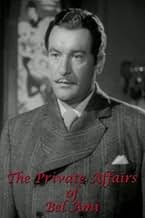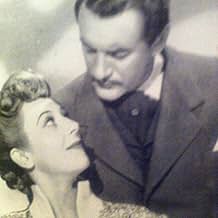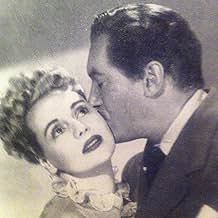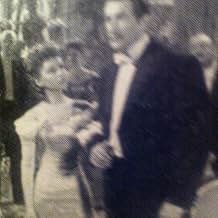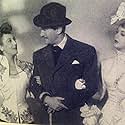IMDb RATING
6.7/10
880
YOUR RATING
In 1880, in Paris, chance brought together two former comrades-in-arms - Charles Forestier, who had become a journalist for "La Vie française" - and Georges Duroy, idle since leaving the six... Read allIn 1880, in Paris, chance brought together two former comrades-in-arms - Charles Forestier, who had become a journalist for "La Vie française" - and Georges Duroy, idle since leaving the sixth regiment of hussars.In 1880, in Paris, chance brought together two former comrades-in-arms - Charles Forestier, who had become a journalist for "La Vie française" - and Georges Duroy, idle since leaving the sixth regiment of hussars.
- Director
- Writers
- Stars
Susan Douglas Rubes
- Suzanne Walter
- (as Susan Douglas)
- Director
- Writers
- All cast & crew
- Production, box office & more at IMDbPro
Featured reviews
Maupaussant's roaring tale of the rise of Duroy is tamed slightly in this version, with George Sanders bumbling rather scheming his way to the top. It's let down by some poor production values, although the dueling scene at the end is well handled. Worth watching for the shocking view of 'The Temptation of St Anthony' in ultra-modern colour (about three quarters the way through) alone.
Director Lewin started out on his own with a trio of literary adaptations: Somerset Maugham's Moon And Sixpence (1943) was followed by Oscar Wilde's The Picture Of Dorian Gray (1945), and then came this version of Guy de Maupassant's best novel, Bel-Ami, in 1947. George Sanders appeared in all three, giving each a distinct flavour by his presence. A self-obsessed and destructive individual appears in all, increasingly prepared to isolate himself from conscience or morality in order to achieve his goals - at least until an ending brings some comeuppance or resolution. In the first, Sanders plays a Gauguinesque painter, who deserts his family to work in Tahiti. In the second, Dorian Gray pursues his famously immoral activities, Sanders in attendance, whilst Gray's famous painting grows ugly in the attic. In The Private Affairs Of Bel Ami (aka: Women Of Paris, 1947), Sanders returns to centre stage portraying a man climbing to social success over a succession of suffering women.
Scriptwriter-director Lewin brought to each of these films characteristic qualities: literate dialogue, visual excellence, and a representation of interior states through colourful moments of art among them. In the fin de siècle worlds of Dorian Gray and Bel Ami, Lewin sharpens the unease and implicit questioning of mores shown in his earlier Maugham adaptation. Avoiding the temptations of melodrama, he chooses specific historical milieu by which to communicate the ennui of the privileged and the corrupt. Sanders is excellent as George Duroy, the title's charming and unscrupulous social climber, who cannot be trusted with hearts - or come to that, much else: one in the words of the title song who " will be leaving me, (and) who will be deceiving me.." First seen down to his last few francs in 1880's Paris, Duroy's suave looks continually make him irresistible to women have brought him little in the way of fortune. Offered a chance job in journalism by his ex-army friend Forestier (John Carradine), Duroy asks Forestier's independently minded wife Madeline to help with the creation of a first article, while also entering into a relationship with the far more doting Clotilde (Angela Lansbury). Soon the seductive antihero is on his way up the social scale after marrying Madeline (a suggestion he promptly broached in the hapless Forestier's death chamber). Later after engineering a scandal, he divorces this first wife, and acquires a defunct aristocratic title with a view to moving on and up again.
"You're a sneak thief... you take advantage of everyone, you deceive everyone," is the way the disillusioned Clotilde eventually personifies Duroy towards the end of the film, after he callously steals her heart, another man's wife and half her inheritance, then the family name of a missing heir, and finally inveigles the hand of a rich innocent. This single-minded obsession in reaching the top of the social ladder echoes that of the ambitious Horace Vendig in Ulmer's Ruthless, made the following year. Duroy's manipulative, seductive charm brings echoes too of Chaplin's Monsieur Verdoux, also from 1947. But while Duroy's progress does not directly lead to murder, it is more detestable and insidious. Whereas at the close of his film Verdoux offers disingenuous apology for his actions, Bel Ami (although saddled with a ending more in line with the demands of the censor than the original novel) is unrepentant, equating his final misfortunate as being "scratched... by an old cat." There are several elements that make Lewin's film interesting today, being the independent work of a minor, if idiosyncratic auteur, then relatively unusual. Even though the aspirational cad makes use of the women he gets to know, Madeline remains a strong and talented character in her own right. Besides helping Duroy with his writing at the very start, there is a strong suggestion that she has actually been doing much of her first husband's journalism for him too. And despite her final betrayal, she continues to impress as an individually motivated female, in contrast to the ever-loving and forgiving Clotilde. Both are victims but Duroy's emotional abuse and subjugation of them and others is a comment on his own coldness as well as on the liabilities of females in a prejudiced society, made especially keen by the knowledge each woman has of her own predicament. For men, the answer to honour slighted is a duel. Women at best are obliged to fall back on subterfuge or, at worst, live with the grief of a broken heart.
Each of Lewin's first three films was made in black and white. But they also included moments when the screen bursts into startling colour, as the audience contemplates painting central to the theme. The Moon And Sixpence brings a final sequence showing the artist's work, a form of artistic justification for preceding events. In The Portrait Of Dorian Gray, the painting in question reflects back directly the moral dissolution of the subject. Bel Amis' canvas occupies a more complex position in its narrative than its predecessors. It's an expensive work of art, bought by a wealthy patron and admired by Duroy, - one of the few moments in which, half to himself, he evidently expresses an honesty with anything. Painted by Max Ernst (his Temptation Of St Anthony) it reflects back the decadence of its admirers, as well as continuing the plot's subtle thread of damnation.
An excellent cast includes a young Lansbury as Duroy's one true love, and John Carradine as his tuberculosis-ridden journalist friend. Audiences today will be impressed by how modern the feel of it all is, whether in the depiction of Duroy's amoral, manipulative character, completely unfazed at being disliked, or the film's sophisticated and sympathetic treatment of women. Lewin's next work was the weirdly romantic Pandora And The Flying Dutchman (1951), his most ambitious film, the reception of which proved a disappointment. He never rose to such heights again. The Private Affairs Of Bel Ami, is less flamboyant perhaps but just as unforgettable, remaining his most satisfying work.
Scriptwriter-director Lewin brought to each of these films characteristic qualities: literate dialogue, visual excellence, and a representation of interior states through colourful moments of art among them. In the fin de siècle worlds of Dorian Gray and Bel Ami, Lewin sharpens the unease and implicit questioning of mores shown in his earlier Maugham adaptation. Avoiding the temptations of melodrama, he chooses specific historical milieu by which to communicate the ennui of the privileged and the corrupt. Sanders is excellent as George Duroy, the title's charming and unscrupulous social climber, who cannot be trusted with hearts - or come to that, much else: one in the words of the title song who " will be leaving me, (and) who will be deceiving me.." First seen down to his last few francs in 1880's Paris, Duroy's suave looks continually make him irresistible to women have brought him little in the way of fortune. Offered a chance job in journalism by his ex-army friend Forestier (John Carradine), Duroy asks Forestier's independently minded wife Madeline to help with the creation of a first article, while also entering into a relationship with the far more doting Clotilde (Angela Lansbury). Soon the seductive antihero is on his way up the social scale after marrying Madeline (a suggestion he promptly broached in the hapless Forestier's death chamber). Later after engineering a scandal, he divorces this first wife, and acquires a defunct aristocratic title with a view to moving on and up again.
"You're a sneak thief... you take advantage of everyone, you deceive everyone," is the way the disillusioned Clotilde eventually personifies Duroy towards the end of the film, after he callously steals her heart, another man's wife and half her inheritance, then the family name of a missing heir, and finally inveigles the hand of a rich innocent. This single-minded obsession in reaching the top of the social ladder echoes that of the ambitious Horace Vendig in Ulmer's Ruthless, made the following year. Duroy's manipulative, seductive charm brings echoes too of Chaplin's Monsieur Verdoux, also from 1947. But while Duroy's progress does not directly lead to murder, it is more detestable and insidious. Whereas at the close of his film Verdoux offers disingenuous apology for his actions, Bel Ami (although saddled with a ending more in line with the demands of the censor than the original novel) is unrepentant, equating his final misfortunate as being "scratched... by an old cat." There are several elements that make Lewin's film interesting today, being the independent work of a minor, if idiosyncratic auteur, then relatively unusual. Even though the aspirational cad makes use of the women he gets to know, Madeline remains a strong and talented character in her own right. Besides helping Duroy with his writing at the very start, there is a strong suggestion that she has actually been doing much of her first husband's journalism for him too. And despite her final betrayal, she continues to impress as an individually motivated female, in contrast to the ever-loving and forgiving Clotilde. Both are victims but Duroy's emotional abuse and subjugation of them and others is a comment on his own coldness as well as on the liabilities of females in a prejudiced society, made especially keen by the knowledge each woman has of her own predicament. For men, the answer to honour slighted is a duel. Women at best are obliged to fall back on subterfuge or, at worst, live with the grief of a broken heart.
Each of Lewin's first three films was made in black and white. But they also included moments when the screen bursts into startling colour, as the audience contemplates painting central to the theme. The Moon And Sixpence brings a final sequence showing the artist's work, a form of artistic justification for preceding events. In The Portrait Of Dorian Gray, the painting in question reflects back directly the moral dissolution of the subject. Bel Amis' canvas occupies a more complex position in its narrative than its predecessors. It's an expensive work of art, bought by a wealthy patron and admired by Duroy, - one of the few moments in which, half to himself, he evidently expresses an honesty with anything. Painted by Max Ernst (his Temptation Of St Anthony) it reflects back the decadence of its admirers, as well as continuing the plot's subtle thread of damnation.
An excellent cast includes a young Lansbury as Duroy's one true love, and John Carradine as his tuberculosis-ridden journalist friend. Audiences today will be impressed by how modern the feel of it all is, whether in the depiction of Duroy's amoral, manipulative character, completely unfazed at being disliked, or the film's sophisticated and sympathetic treatment of women. Lewin's next work was the weirdly romantic Pandora And The Flying Dutchman (1951), his most ambitious film, the reception of which proved a disappointment. He never rose to such heights again. The Private Affairs Of Bel Ami, is less flamboyant perhaps but just as unforgettable, remaining his most satisfying work.
Although hard to get into this film, with a protagonist who is very unlikable and who, for all his scheming, seems to be falling upward in the social hiearchy more than effectively manipulating those he seeks to use, the movie is worth watching in order to contemplate the young and beautiful Angela Lansbury and the older, wiser, but still beautiful Ann Dvorak. And for the climactic duel.(And some might find the couture sufficiently haute to be worth watching.)
The score by the great French composer, one of Les Six, Darius Milhaud, is pedestrian. Milhaud is not responsible for the annoying song "Bel Ami" which recurs far too often during the seemingly interminable 112 minutes of the movie in the version I saw.
The score by the great French composer, one of Les Six, Darius Milhaud, is pedestrian. Milhaud is not responsible for the annoying song "Bel Ami" which recurs far too often during the seemingly interminable 112 minutes of the movie in the version I saw.
The Private Affairs of Bel Ami (1947)
The weary diffidence of George Sanders makes this movie what it is, but there is a rather large cast of important characters who hold up their types, too. Only Sanders in the lead role (as the Bel Ami) has full roundness to his character. Look, however, for John Carradine and Elsa Lancaster, both welcome and convincing, though they only appear sporadically. Ann Dvorak takes on the second most important role and she's terrific, cast perfectly and acting with cunning.
The story is a period piece, set in late 19th century France. It centers really around one idea--Sanders, who is portraying a real lady's man, gets several women interested in him (or he in them) with somewhat suspicious goals (like money) under his hat. The first half of the movie has these women at odds with each other and Sanders playing his hand just so. Then he lands one of them and a different kind of ambition takes over his life, with some tricks to become yet wealthier. And the movie shifts. It gets fairly complex, based on a French novel by Guy de Maupassant. It has enormous potential, and yet it never quite gels. You can imagine a "Magnificent Ambersons" kind of construction to make it work, but that would require more length. And Orson Welles.
The writing is naturally amazing at times. The characters, as much as they get developed, are intelligent and say intelligent things.
There are two aspects that plague this version. First is Sanders himself. He's one of my favorite actors of this era, but he has a limited kind of style and he's miscast here, lacking the charm and fast wit you would need to pull off all these machinations, some romantic and some political. Second is the way the story is told, cramming the pieces together, jumping from one moment into the future as if there wasn't time to mention that so and so meanwhile died, or that our main man in fact got married. Sometimes this kind of economy makes for a fast movie, but here it feels too harshly edited.
And then there is the slight falseness to the filming, all done in studios, with hints of the city in the background, beautiful but unconvincing light, and sound that is dubbed or added and is sometimes painfully wrong (Sanders whistling without moving his lips, Carradine playing a complicated accordion piece on an instrument without keys, footsteps on a stone walk that sound like a wooden stage, a singer who...you get the idea). The director, Albert Lewin, had a thriving career writing for silent movies (there is an irony in that, I suppose), then he became a producer in the 1930s before switching to directing just a half dozen films in the 1940s. Only one of these has a reputation--The Picture of Dorian Gray--with this one a kind of runner-up. But whatever its promise, it struggles to take off as either a romantic heart-tugger or a social high drama.
Small tidbit--Uma Thurman and others are filming a remake of this story, and naturally all the womanizing has taken on a sexual quality, from what I can see. That's a strength with the way Lewin shot and edited this early one, because we get the way the leading man is a selfish cad without having to get distracted into the prurient details that would distract, even further, from the larger plot.
The weary diffidence of George Sanders makes this movie what it is, but there is a rather large cast of important characters who hold up their types, too. Only Sanders in the lead role (as the Bel Ami) has full roundness to his character. Look, however, for John Carradine and Elsa Lancaster, both welcome and convincing, though they only appear sporadically. Ann Dvorak takes on the second most important role and she's terrific, cast perfectly and acting with cunning.
The story is a period piece, set in late 19th century France. It centers really around one idea--Sanders, who is portraying a real lady's man, gets several women interested in him (or he in them) with somewhat suspicious goals (like money) under his hat. The first half of the movie has these women at odds with each other and Sanders playing his hand just so. Then he lands one of them and a different kind of ambition takes over his life, with some tricks to become yet wealthier. And the movie shifts. It gets fairly complex, based on a French novel by Guy de Maupassant. It has enormous potential, and yet it never quite gels. You can imagine a "Magnificent Ambersons" kind of construction to make it work, but that would require more length. And Orson Welles.
The writing is naturally amazing at times. The characters, as much as they get developed, are intelligent and say intelligent things.
There are two aspects that plague this version. First is Sanders himself. He's one of my favorite actors of this era, but he has a limited kind of style and he's miscast here, lacking the charm and fast wit you would need to pull off all these machinations, some romantic and some political. Second is the way the story is told, cramming the pieces together, jumping from one moment into the future as if there wasn't time to mention that so and so meanwhile died, or that our main man in fact got married. Sometimes this kind of economy makes for a fast movie, but here it feels too harshly edited.
And then there is the slight falseness to the filming, all done in studios, with hints of the city in the background, beautiful but unconvincing light, and sound that is dubbed or added and is sometimes painfully wrong (Sanders whistling without moving his lips, Carradine playing a complicated accordion piece on an instrument without keys, footsteps on a stone walk that sound like a wooden stage, a singer who...you get the idea). The director, Albert Lewin, had a thriving career writing for silent movies (there is an irony in that, I suppose), then he became a producer in the 1930s before switching to directing just a half dozen films in the 1940s. Only one of these has a reputation--The Picture of Dorian Gray--with this one a kind of runner-up. But whatever its promise, it struggles to take off as either a romantic heart-tugger or a social high drama.
Small tidbit--Uma Thurman and others are filming a remake of this story, and naturally all the womanizing has taken on a sexual quality, from what I can see. That's a strength with the way Lewin shot and edited this early one, because we get the way the leading man is a selfish cad without having to get distracted into the prurient details that would distract, even further, from the larger plot.
an adaptation. and a great cast. perfect choice for Georges Duroy character. a subtle, precise, impressive George Sanders in one of his magnificent roles. so, the key is not manner to adapted the novel of Maupassant but the art of each actor. because this movie is scene for a lot of stars. the story is old but the play is new. the novel is French and the science of details and nuances makes this American movie fruit of French cinema. the tale of Bel Ami is, in great measure, grace of Sanders and his partners, slice of Dorian Gray. it is not a masterpiece but it is a very interesting lesson. to define a world, to discover a book, to escape from Nick Ormerod last adaptation spell. a film as old yellow picture. good beginning to visit a world, to joy with drops of old fashion cinema style, to rediscover few crust of emotions and reflection to our small and bleak world.
Did you know
- TriviaThe producers held a contest for artists to create a painting about the temptation of Saint Anthony for use in this movie. The artists were paid five hundred dollars each and got to keep their paintings after the pictures toured the U.S. and Britain during 1946 and 1947. Although Max Ernst won the contest (receiving an extra two thousand five hundred dollars) and got his painting on-screen, Salvador Dalí's contribution (featuring a parade of spider-legged elephants tormenting the saint) became better known. The other artists who submitted paintings are Leonora Carrington, Ivan Le Lorraine Albright, Stanley Spencer, Eugene Berman, Paul Delvaux, Louis Guglielmi, Horace Pippin and Abraham Rattner. Artist Leonor Fini was also invited to contribute, but she didn't produce a painting.
- GoofsAt 9', a piano player and a violin player are doing a number. We hear a vibrato on the violin, but the left fingers of the player are not moving at all.
- Quotes
Georges Duroy: [dying] I have been scratched by an old cat.
- Crazy creditsOpening credits: "This is the history of a scoundrel. The time is 1880 and the place is Paris."
- ConnectionsReferenced in Inglourious Basterds (2009)
- SoundtracksMy Bel Ami
by Jack Lawrence and Irving Drutman
- How long is The Private Affairs of Bel Ami?Powered by Alexa
Details
- Release date
- Country of origin
- Language
- Also known as
- Guy de Maupassant's The Private Affairs of Bel Ami
- Filming locations
- Production company
- See more company credits at IMDbPro
- Runtime1 hour 52 minutes
- Color
- Aspect ratio
- 1.37 : 1
Contribute to this page
Suggest an edit or add missing content


